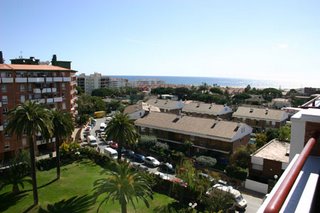
These last days have been strange and active. some consultancy work got comission to Joan in Lima for the World Bank just before a weekend in Barcelona. Weekend was busy,
we experienced with having six friends of us from London, and was fun. The only incovenient was that Marta's bag with all her things got stolen whilst having a drink in Irati (a restuarant in the city centre , pretty nice). We could repot the crime on the internet, and we managed to replaced every thing ina few hours, the initial shock went off it is just a new story to tell. At the end of the day ,they only steal a replaceable object (although when the bag is Marta's, then the bg is probably more expensive than the content. Finally, the day after, someone discovered Marta's wallet and agenda in a bin nearby carrer del carme at the other sid eof Las ramblas, so the stroy ended up well. Anyhow, that night we were saved by Marta's sister Anna and Javier that went to Marta's parent to get another copy of Marta's car as we were supposed to drive all back home. That night Joan had no sleep as got the flight to Perú at 5 am, a KLM flight Barcelona-Amsterdam-Bonaire ( Dutch Antilles)- Lima, that took about 22 hours . Once in Lima, got cheated by the taxi driver , it is not corruption nor it is smuggling, simply that they don’t give back the right change and you assume people are honest. Food was excellent.
Peru as the culinary capital of Latin America, even at the World Bank (WB) offices they eat properly. WB Work was in group. Four or us headed by Monique Mrazek followed by Jorge Carichio from Chile and Oscar Humar an Argentinean from Slovenian origine. The Peruvian experience demostrates that “free” market means that a both local and international corporations are more free ad less tight to respct human and economic rights. Free means in developing countries lack of order, deregulation, no rules . As a
result 20% of drugs are sold in the black market and nothing can be done, that despite the state regulates the market, there is no way to enforce the law, that 70% of pople cannot pay for basic health care needs. Some treatements cost twice the household monthly salary and there is no help whatsoever from the "free state".
In other words, it is a savage civilization despite all its modernity, it shoudl be the shame of US political influence. Shame on all of us for accepting the system like this. The country is in hand of few elites normally white that determine government priorities whilst the vast majority of the population has no real influence (middle classes and the poor).
Salaries are really bad ( 70 £ a month in a city like Lima) and prices for certain essential products such as drugs are even higher that those of developed world. Average salary in Lima is approximately the same price as a room in our hotel which belongs to the American chain Marriot. The country's public servants all look totally captured by some interest groups with close links with the industry, they need to make thier life they say, bastards! The same aplied to doctors, with the exception of only few young doctors that still beleive in the hypocratic principles ruling doctors profession. The Pharmacy General director was a women ( such as the Minstry of Health) that we informally called ”la ministra”, a 1.40 m tall lady with corrupt face that cultivates bonsais as a main job actitivty. She is literally queen of the deparment and treated all the rest literally as "sheet". Next was the time to visit some labs and distributors called “doguerias”. The industry is divided into confronted local and foregin companies, but when needed they collude .
Security is not guaranteed by the state and Joan had trouble in a vist to a drugstore. After knocking the main building door , a guy at the other side of a black window asked for the passport ( and kept it for a long while) and inspect the taxi that was driving me (and waiting for me later to dive me back to downtown).
Then literally a group a paramilitary carrying weapons escorted him to the operating offices and once there a bunch of gagster-type guys asked in a very strong and rude way: - “what do you want!”. Happyly, nothing happened, just another experience that might come out in the nest nightmare.
Peruvians are interesting, they are overall slim as food despite being excellent. Hardly anyone smokes ( and its clearly a symbol of low social position to smoke), people do not drink that much either. Typical beers are 'cristal' and a sort of pilsner not especially bad, but after the secondthey all look at you as an alcoholic.




